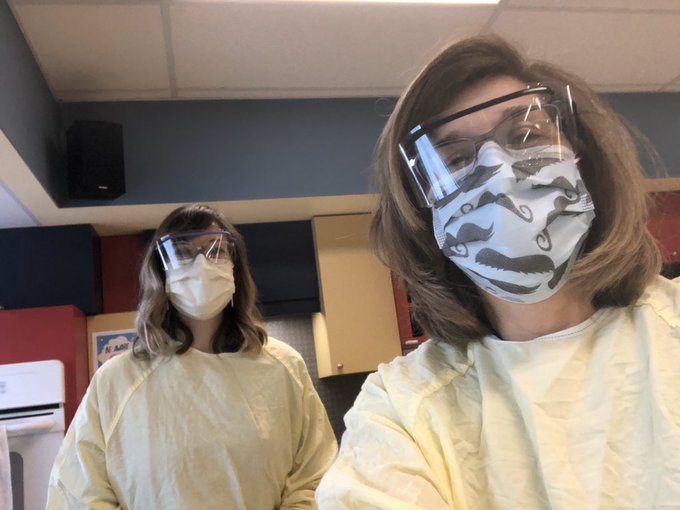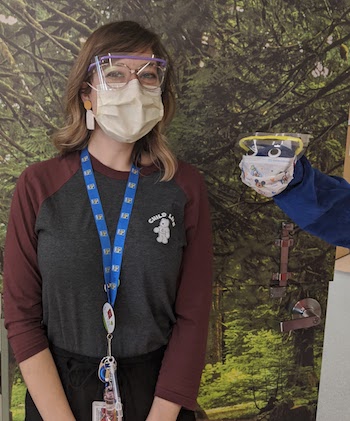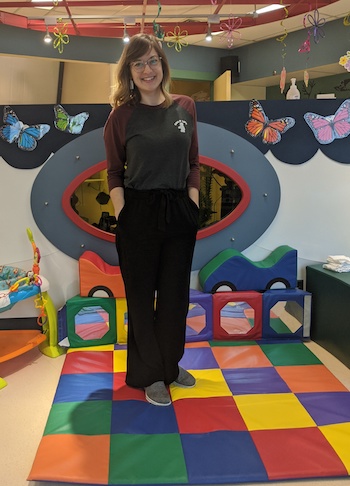Child Life student rides pandemic wave during hospital internship

When Danielle Geddes started her Child Life Specialist internship on the acute medical inpatient ward at Children’s Hospital of Winnipeg in February, she had no idea that by the end of it she would be fully masked and wearing protective gear for most shifts with her young clients.
Geddes, who is completing a Child Life and Community Health graduate certificate at UFV, had to adjust quickly to the new reality of healthcare in the COVID-19 age.
And since her internship focused on helping children feel comfortable and less anxious in an already stressful healthcare setting, that adjustment included putting a mask and protective eyewear on a puppet to help explain to the children why hospital staff were wearing them.
For her internship, Geddes worked in an acute medical inpatient unit and the staffed playroom in the inpatient unit.

“I worked with a child life specialist to help families support their children developmentally, provide psychological preparation of procedures for children in developmentally appropriate language, and provide distraction and coping strategies for painful or stressful procedures.”
Geddes, who already holds a BA (Hons) in linguistics and psychology, hadn’t even heard of child life specialists until 2017, when a friend mentioned the career to her.
“I started doing some research on the child life field and thought it would be a fantastic fit for me as a career, so when I realized UFV was starting a graduate certificate program in Child Life and Community Health, I applied right away.”
For the first part of her 600-hour internship, Geddes got to experience a range of practice within the field, including helping patients mentally prepare for surgery, working with chronically ill or palliative patients, and providing developmental support.
Halfway through March, the world, and Geddes’ practicum, changed due to the impact of COVID-19.
“Policies started changing at the hospital. For a while, I wasn’t sure whether or not I would be able to finish my internship, but they were grateful for the extra pair of hands in the Child Life department.
“As time went on, more things changed in how we were able to provide our services. By the time I left, our hospital library was no longer open to patients, though child life staff could sign out books on the patient’s behalf. While our ward playrooms were closed, with the support of infection control we continued to provide one-on-one play sessions in our main playroom. For a while the policies surrounding personal protective equipment were changing daily, sometimes differing from unit to unit, so it was important to communicate well with our team about the proper procedures.”
Geddes came to realize that the role of child life specialists was more important than ever in the midst of the pandemic. But it also helped her understand that for children in hospital, social isolation is always an issue.
“Through this experience, I was reminded of the importance of providing psychosocial care for children and families in isolation. Even when there isn’t a pandemic, there are children and families who have to be in isolation at the hospital. They can’t see their friends, they may have limited contact with their family members, and most of the interactions they are having are with people dressed in yellow gowns with masks and gloves on. We are all experiencing a little bit of what that is like now. I was reminded that the psychosocial care we provide even in non-pandemic times has a huge impact on a patient’s hospital experience and their wellbeing. And sometimes we have to get creative in order to provide that care!”
Since the number of visitors patients were allowed was limited due to the pandemic, the child life specialists worked extra hard to make children and their families feel safe and supported.
“I helped make activity kits for nurses to bring into certain rooms to limit the number of people interacting with the patients, and put together hygiene kits for children and families who had to be isolated. For Easter, we put together gift baskets for each patient and materials for egg hunts so that nurses could spread some extra joy to the patients.”
And she got to learn and practise some media skills.
 “I also made a few guest appearances on the in-hospital TV program. We film a daily show with a puppet named Noname, so I joined Noname and some child life specialists on the program to do therapeutic art activities and discuss coping strategies. Noname also wore a mask and eye protection to help explain why staff are wearing them and to normalize them for the children.”
“I also made a few guest appearances on the in-hospital TV program. We film a daily show with a puppet named Noname, so I joined Noname and some child life specialists on the program to do therapeutic art activities and discuss coping strategies. Noname also wore a mask and eye protection to help explain why staff are wearing them and to normalize them for the children.”
The Child Life team also worked with the hospital’s infection control department to make sure that they followed protocols to run things as safely as possible while still providing psychosocial care.
“While our staffed playroom was closed, we could still offer play sessions with one patient in the playroom at a time. The opportunity for play and socialization is so important for patients, especially the long-term ones who can’t have visitors right now.”
Completing her internship during a pandemic helped reinforce for Geddes that her choice of career is the right one for her.
“I immediately felt like a part of the child life family at the hospital. They each brought incredible experience to the team and I was able to learn from so many different people who encouraged me and helped shape what kind of child life specialist I want to be. I was impacted by the amazing and resilient children I met every day, who sometimes had to experience difficult and scary things but were learning healthy coping strategies and had the opportunity to ‘be kids’ through play, even at the hospital.”
Geddes is now preparing for a certification exam in her field, and hunkered down at home like many Canadians.
“I am now preparing for the certification exam, which I hope to write this summer. I find I work best with routine, so it helps me to follow a daily routine and to set some goals for my day. Some specific ways I have of coping are to stay in touch virtually with family and friends, to be careful of how much time I spend on social media, and to balance studying with hobbies.”
And she has some advice: take it easy on yourself.
“I read an article recently where the author reminded readers that we feel pressure to be productive with this time at home, but that the reason we have more time is because we are experiencing a collective trauma, so it’s okay to not feel productive. I thought that was an important perspective to remember at the times when I feel overwhelmed or uncertain of the future…those feelings are normal. It helps me to process through the emotions I am experiencing and to share them with a loved one.”




